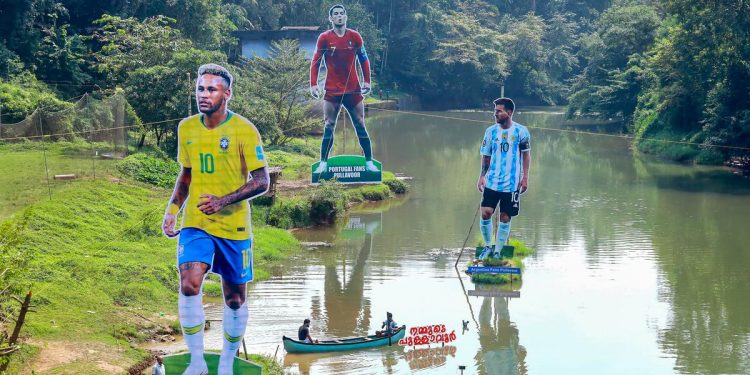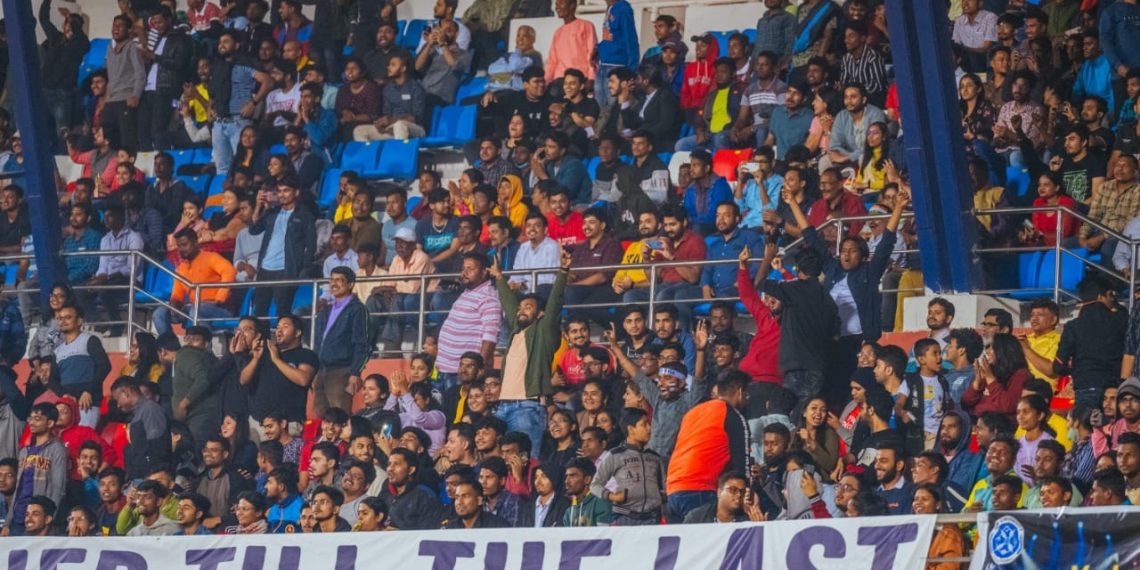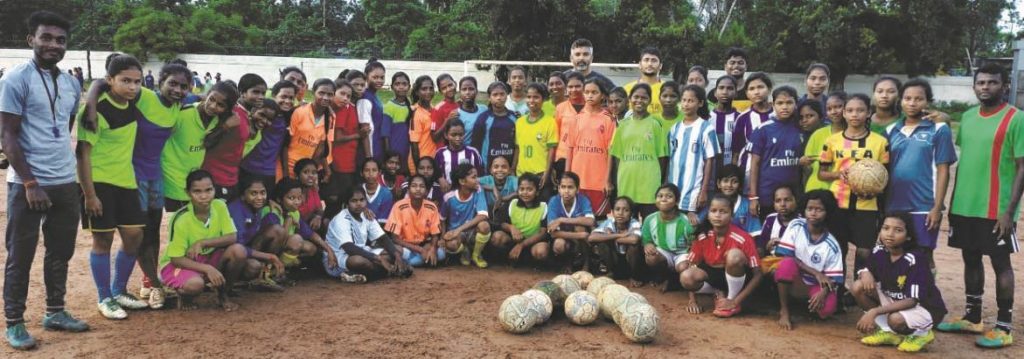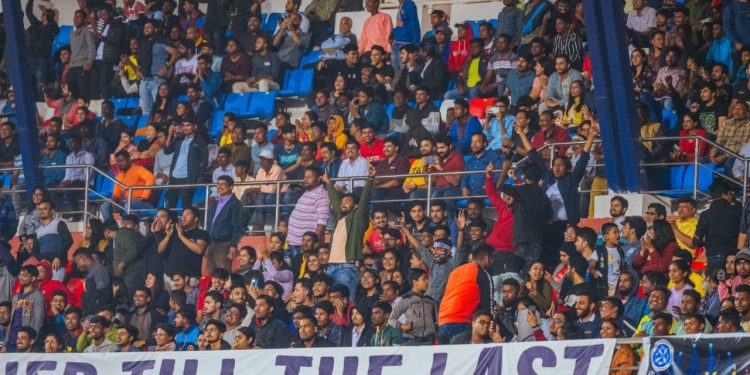On Twitter, a user with the username Rizw4n, October 31, shared a 42-second video with the caption ‘behind the scene’ and the hashtag ‘vamos argentina’. The video was of some eleven men carrying something large. The men passed through the village, holding in their hands what looked like metal bars, as it rained mildly over their heads. Many of them sported jerseys of the Argentinian football team.
Few days before, a picture from India had created a buzz all over the soccer world. As some fishermen cast their nets, a 30-foot-tall larger-than-life cut out of the Argentinian football player Lionel Messi stood on a mound in the middle of a river. The video Rizw4n had shared was of Argentinian fans from the Pullavoor village in Kerala’s Kozhikode district carrying that cut out to be installed in the middle of the Kurungattu Kadavu river.
However, what unfolded after was a drama no one had anticipated. Fans of the Brazilian team, in competitive spirit, installed a bigger 40-feet-tall cut out of the star player Neymar Jr just some metres ahead of that of Messi’s.
With the intent to top them all, a few days later, fans of the Portuguese star Ronaldo brought up an even bigger cut out of their favourite player, measuring close to 50 feet. It was a sight to behold, Ronaldo standing behind Messi, standing behind Neymar, each in a race to be the GOAT (greatest of all times), at least in the imagination of these fans who measured their adoration for them in square inches of cardboard.

But sometimes, these fan obsessions cross the limits of what can be considered civil and benign. Instances of fans of rival teams attacking each other in real life, and hurling abuses at each other on online forums, are now a common sight. In Kerala, KK Shajeendran, a football analyst, registered a complaint with the Palarivattom police as he started receiving abusive and threatening messages from fans of an international player he had criticised. “Modern football fans seem to be more fanatic followers of individual players rather than old school fans who supported a club or team. The players they worship are beyond criticism, and the ones who dare do it are singled out for abusive and hateful treatment,” Shajeendran told The Hindu.
But the love for football, or any sport for that matter, when channeled in the right direction, can make people do extraordinary things. Biju Patnaik, a former CM of Odisha, played football with his elder brother George Patnaik, and his love for the sport led him to start a national football tournament in Odisha, the Kalinga Cup, which was quite extraordinary for its time.
As fans cheer for their chosen players in the FIFA World Cup 2022, Sunday Post sits down with some players and fans whose love for football has pushed them to go beyond their normal responsibilities and take up the larger cause of promoting the game and using it as a tool to bring change in society.
“We can make better teams only if we have better players. And better players will come up when we will have more people playing football, at more grounds, with more participation in tournaments.”
Rajendra Prasad Singh
Through thick and thin

As far as fandom goes, there is no fan group more committed than the Juggernauts. They are the official fan club of Odisha FC, an Indian Super League (ISL) football team which has made Odisha its home base since 2019. The Juggernauts make it a point to attend every game that the club plays at the home stadium and when the game is out of state, they make sure to have its public screenings. They have even planted 101 trees at Dharmashala, Jajpur, commemorating the goals, assists, saves, and clean sheets kept by their team in 2019.
“Fans are also stakeholders in the success of the team,” believes Projjal Prajna Das, a founding member of the Juggernauts. “Odisha FC became the first ever club to come out vocally in support of the pride movement. And it’s the first club to have a women’s team,” but even before that, “the Juggernauts have collaborated with organisations like Parichay to create awareness on trans rights.” They have a women’s wing, and on International Women’s day, they have held training camps and conducted drills and routines for young girls “to pique their interests in football.”
Often these initiatives of the fan club surpass those of the team. Their research team produces podcasts that make the game more accessible and help the players connect with the people. During the lockdown, “when social media was flooded with people sharing their experiences with anxiety and depression,” they held a seminar on mental well-being with the staff and players of Odisha FC participating. “We had to keep the flame alive, just couldn’t let it extinguish,” says Projjal, who is also a fan of the German club Bayern Munich.
The fan club, which now has a total of six chapters, not only in cities like Pune and Hyderabad, but also in the US and Canada, has given unwavering support to Odisha FC since the start. “But we haven’t always found the team management to be responsive to our inputs and feedback, be it regarding marketing or in public outreach,” Projjal says. “They should be more open to the local crowd and organising scouting and training camps will go a long way in earning them the much-needed goodwill,” he suggests.
Football has never been as popular in Odisha as it is in the neighbouring state West Bengal. But Odisha has produced players who have gone to play for the national team and for clubs like Mohun Bagan, Mohammedan SC, and BNR.
Quantity yields quality
If fans are the devout followers who preach the religion of football off the field, players are the anointed monks who practise it on the field.
Football has never been as popular in Odisha as it is in the neighbouring state West Bengal. But Odisha has produced players who have gone to play for the national team and for clubs like Mohun Bagan, Mohammedan SC, and BNR. Among these players, Rajendra Prasad Singh, from Cuttack, has the most remarkable career.
Though Singh started late, in 1990, he quickly rose to become the captain of the Odisha team playing in the Santosh Trophy, arguably the most prestigious tournament in men’s football in India. In 1994, under his captaincy, the Odisha team played the semi-finals, against Kerala. Coincidentally, the last time Odisha had gone till the semis was under his father Deba Singh’s captaincy in 1967-68, where it had lost to Mysore.
His career took off, when in 1997, while playing for SBI, he, by luck he says, was spotted by people from Mohun Bagan. “There I flourished as I played among better players,” says Singh, who was a part of the club squads that won the National Football League (NFL) titles three times. Then he played in the Santosh Trophy for West Bengal.
Asked about the dismal football scenario in Odisha in the context of the ongoing FIFA World Cup, he referenced the group stage match where the KSA team, to everyone’s surprise, had beaten Argentina. “When the Saudis defeated Argentina, the UAE government declared the next day a national holiday, because they knew their players had achieved something beyond themselves. Likewise, given the quality of our players, we should also appreciate and reward teams who even reach the quarter-final stages in national tournaments,” he pointed out.
To the question of how we can get better quality players, Singh believes that quantity will yield quality. “We can make better teams only if we have better players. And better players will come up when we will have more people playing football, at more grounds, with more participation in tournaments.” And “we can draw more people to the game when we can assure them of a secure future, like giving them jobs through sports quota.”
Shradhanjali Samantray, who once captained the women’s national team, agrees that tournaments and training will enhance the quality of players. “With events like the U-17 Women’s FIFA World Cup, our girls are being exposed to the techniques and tactics of international players, which is helping them improve their game. And with tournaments like Odisha Women’s League and India Women’s League, they are getting a chance to refine their skills while playing against quality footballers from other states,” says Shradhanjali who mentors several women’s football teams in the state.
But other than the government and the associations, RP Singh, who mentors the Sunrise Club in Cuttack, believes parents and media also have a role to play in football’s success.
On the importance of media and documentation broadly, senior journalist and ardent football fan Samiran Mishra says that when it comes to football, “In Odisha, we haven’t been great at record keeping.” Giving an example he adds, “There’s little to no recognition for Abdul Majid Bachan, from Cuttack, who went on to captain Mohammedan Sporting, eventually becoming the first India international from Odisha. There should be a conscientious effort from the state sports bodies and the government to preserve records of the legendary feats that athletes from the state have achieved.”
“To really become the sports capital, we have to act at the grassroots, at the school level, with every school having sports coaches across at least five disciplines, which will also be beneficial for retiring players who can join as coaches rather than working as clerks and constables.”
Jayadev Mahapatra
From slums to stardom

In the state capital, football is adopting new trends after the pandemic. The football-playing crowd of the city has wholeheartedly embraced futsal, a football-like game that’s played on a hard court with five or six players on each side. “There aren’t simply enough grounds to hold matches with 11-player teams. Also we don’t have enough time and now you have a couple of futsal turfs in the city that you can rent to host matches,” explains Swagat Kumar Jena, 22, a player who fell in love with the game watching the 2010 World Cup through his neighbour’s window.
But Jayadev Mahapatra, JD as people call him, is on a mission to build an ecosystem in the state that would produce players of international calibre. In 2012, with a coaching license from AIFF, he started Ardor Football Academy (AFA). The goal was to scout the city slums for children with raw talent, and then turn them into professional players. When asked why slum kids, Jayadev says, “the kids of these slums, who often come from tribal communities, are more independent, smart, and very fearless. And slum kids have always been great players, take Neymar for example.”
Ardor, which now has some 22 centres and 32 coaches across Odisha, Jharkhand, and Chhattisgarh, made headlines in Odisha when two of its cadets, Sunil Soren and Ranjan Soren, both from the Salia Sahi slum, were picked up by the Punjab FC. JD, who believes “Sports is a clear indicator of social development,” has made two rules for his club: the students have to continue education, attend school regularly, and stay away from drugs and alcohol. “We have developed a kind of discipline in these kids. The game has kept them away from substance abuse and created among themselves a sense of camaraderie,” says JD who has faith in the ability of sports to build good human beings.
As the academy doesn’t charge any fees, JD has been running it with his own money. But that is beginning to change as Ardor has formed partnerships with private schools like ODM and Wisdom Tree to train their students. “Out of the 48 lakh of our annual operational cost, now only 20 per cent comes from these private schools, but we have a plan to develop a sustainable model,” he adds.
Speaking on the state of football in Odisha, he says, “We haven’t become the sports capital of the country, we are only the organising capital, we give the money and we have stadiums,” but to really become the sports capital, “we have to act at the grassroots, at the school level, with every school having sports coaches across at least five disciplines, which will also be beneficial for retiring players who can join as coaches rather than working as clerks and constables.”
Though the state of sports in Odisha is not too encouraging, JD, who preaches the idea of ‘football for all’, is confident that soon some of his players will shine at the international level, a dream that keeps him going.






































